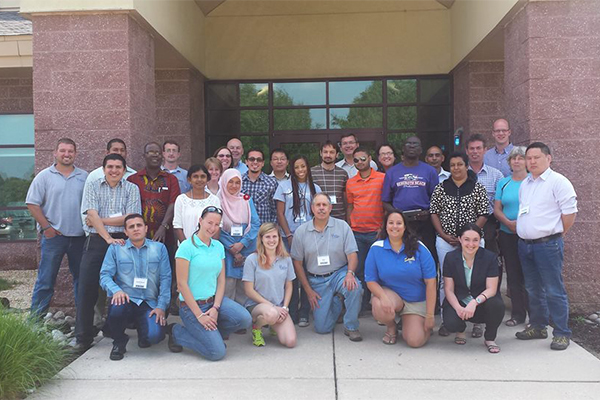
Biosecurity
Emergency Poultry Disease Response workshop considers biosecurity, rapid response
9:16 a.m., Aug. 12, 2014--The University of Delaware welcomed 22 poultry professionals from around the world as it hosted its sixth annual Emergency Poultry Disease Response (EPDR) certificate program July 7-11.
The workshop was held on the College of Agriculture and Natural Resources (CANR) campus and was aimed at teaching both local and international participants about preparedness planning, biosecurity and assessment, and rapid response techniques and technology with regard to avian disease outbreaks.
Campus Stories
From graduates, faculty
Doctoral hooding
Sponsored by the U.S. Department of Agriculture Animal and Plant Health Inspection Service (USDA-APHIS) in conjunction with UD’s Division of Professional and Continuing Studies, this year’s workshop included participants from all over the globe.
The program was lead by Eric Benson, associate professor in the Department of Animal and Food Sciences (ANFS); Robert Alphin, instructor in ANFS and manager of the University’s Allen Laboratory; George Irvine, assistant director of organizational learning solutions in Professional and Continuing Studies at UD, and Dan Hougentogler, research associate in ANFS.
Fifteen countries were represented, including Mongolia, Bhutan, South Africa, Mexico, Malaysia, Ghana, Germany, Egypt, Sri Lanka, Serbia, Georgia, Kenya, Belize, Trinidad and Macedonia.
Alphin explained, “The program has been taught every year since 2009, but this is the first year the program was expanded to five days, including a day-long tour of the Delmarva Broiler Industry hosted by Mountaire Farms Inc. in Millsboro, Delaware.”
Alphin added that two years before the inaugural program in 2009, they ran two similar programs for Romania and Bulgaria.
Alphin singled out Irvine, saying that he “has been a key member of our team from the beginning.”
Benson said the course is adjusted every year based on changes in avian disease understanding. “This program is unusual in that it was developed using grant funding, but has moved to become a self-supporting program.”
During the workshop, participants received instruction from UD faculty members on the core emergency animal disease components – surveillance, quarantine, depopulation or culling and carcass disposal, along with cleaning and disinfection.
“As in previous years, one of the keys to this year’s success was a combination of UD faculty and professionals, adjunct faculty and professionals from other universities, and poultry industry and government experts,” said Alphin. “This year’s participants were enthusiastic and very willing to participate in the group discussions. The dynamics of the group were very positive and made for very stimulating and productive discussions, sharing their own knowledge and experiences.”
Student interns
Benson and Alphin noted that the participants, both this year and in years past, will be able to continue to interact with one another thanks to a Facebook group and through Sakai, both of which were set up and run by student interns.
The inclusion of student interns was new to the workshop this year and the two interns were Gabrielle Dressel and Jaclyn Weiher, both CANR seniors.
Of the interns, Benson said, “One thing we tried to do differently was to include our undergraduate students within the program while giving them an opportunity to meet and interact with the participants.”
Dressel worked specifically for the EDPR program and Benson said she spent her summer “learning how to implement a training program, about assessment, and about working with participants.”
Dressel said she became an intern with the program after taking a class with Benson in the fall. Dressel said she enjoyed the class and that the internship was “available to students who had taken the class because the topics that were covered in this were covered in our class. That gave me at least a base to have seen everything that we were doing so that it wouldn’t be totally new.”
Dressel spent her time during the workshop running Sakai, an on-line educational platform, and also helped with many of the demonstrations. “We did a lot of hands-on demonstrations of different things. Some things were just novelty demonstrations and others were practices that can be used everywhere and are easy to implement,” said Dressel.
As for her favorite part of the workshop, Dressel said that it was great to be able to meet and interact with participants.
“I loved working with all of the participants. We went to Georgetown and to the Mountaire plants, and also to a hatchery, a broiler house and a processing plant, so we were on a bus all day and able to talk to the participants,” said Dressel. “Then we went to the beach afterwards. It was just really cool to meet them and to get to know them better. It was definitely not something that you get to do every day.”
Article by Adam Thomas








